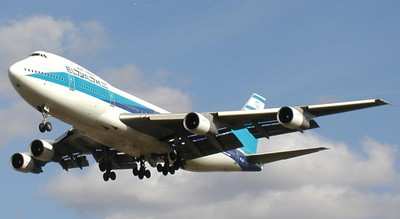Sat, Dec 20, 2008
Category 2 Classification "Not Related To Security Issues"
On Friday, the Federal Aviation Administration (FAA) changed
Israel's aviation safety standard rating to Category 2 following an
assessment made last July of the country's civil aviation
authority. The agency pointedly noted the rating "is not related to
security issues."

Since November 1995, Israel has maintained a Category 1 rating,
meaning the country's civil aviation authority complied with all
ICAO safety standards. A Category 2 rating may involve a country
lacking laws or regulations necessary to oversee air carriers in
accordance with international standards, or that its civil aviation
authority does not meet international standards in one or more
areas such as technical expertise, trained personnel, record
keeping, or inspection procedures.
With a Category 2 rating given by the FAA's International
Aviation Safety Assessment (IASA) program, Israeli air carriers
will not be allowed to establish new service to the United States.
The civil aviation authority of Israel is addressing the items
identified, including working with the FAA on an aggressive action
plan to correct all areas of concern so that their safety oversight
system fully complies with standards and practices set by the
International Civil Aviation Organization (ICAO).
All countries with air carriers that fly to the United States
must adhere to the safety standards of ICAO, the United Nations'
technical agency for aviation. ICAO establishes international
standards and recommended practices for aircraft operations and
maintenance.
The IASA program administered by the FAA assesses the civil
aviation authorities of all countries that have air carriers
operating or might be authorized to operate to the United States.
The FAA also makes this assessment information available to the
public. The assessments are not an indication of whether individual
foreign air carriers are safe or unsafe. Rather, they determine
whether or not foreign civil aviation authorities are meeting ICAO
safety standards, not FAA regulations.
The FAA works with countries to ensure that they comply with
ICAO standards and earn IASA Category 1 ratings.
More News
He Attempted To Restart The Engine Three Times. On The Third Restart Attempt, He Noticed That Flames Were Coming Out From The Right Wing Near The Fuel Cap Analysis: The pilot repor>[...]
Make Sure You NEVER Miss A New Story From Aero-News Network Do you ever feel like you never see posts from a certain person or page on Facebook or Instagram? Here’s how you c>[...]
From 2009 (YouTube Edition): Leading Air Show Performers Give Their Best Advice for Newcomers On December 6th through December 9th, the Paris Las Vegas Hotel hosted over 1,500 air >[...]
Aero Linx: NASA ASRS ASRS captures confidential reports, analyzes the resulting aviation safety data, and disseminates vital information to the aviation community. The ASRS is an i>[...]
“For our inaugural Pylon Racing Seminar in Roswell, we were thrilled to certify 60 pilots across our six closed-course pylon race classes. Not only did this year’s PRS >[...]
 NTSB Final Report: Rutan Long-EZ
NTSB Final Report: Rutan Long-EZ ANN FAQ: Turn On Post Notifications
ANN FAQ: Turn On Post Notifications Classic Aero-TV: ICAS Perspectives - Advice for New Air Show Performers
Classic Aero-TV: ICAS Perspectives - Advice for New Air Show Performers ANN's Daily Aero-Linx (06.28.25)
ANN's Daily Aero-Linx (06.28.25) Aero-News: Quote of the Day (06.28.25)
Aero-News: Quote of the Day (06.28.25)



